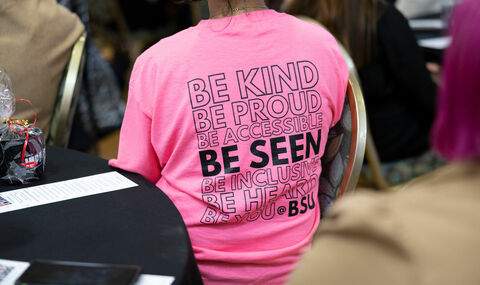SAS Peer Mentoring
Our mentors are experienced undergraduate students that have utilized SAS as a student with a disability. They assist their mentees with various aspects of creating a successful experience at BSU, focusing on identifying and meeting academic and social needs. First-semester Freshman are prioritized for this program, with additional requests fulfilled as we are able. Capacity is limited.
Access Advocates
Access Advocates are BSU community members who deepen their commitment to disability equity by becoming Barrier Breakers, Spark Seekers, and Equity Engineers—and by completing an Access Audit & Advocacy Plan. This four-part experience builds the insight, skills, and confidence needed to identify barriers, imagine inclusive possibilities, and lead change across campus.
#Be Seen
Be Seen is a day-long visual demonstration and interactive event in April, dedicated to honoring disability identities, raising awareness of disability rights, and inspiring accessibility.
Social Programs, Events, and Workshops
A wide variety of social programs, events, and workshops are hosted by SAS throughout the academic year. BSU community members can access the scheduled events on the EngageBSU platform.
Service Animal Planning
If a student will be accompanied by a Service Animal on campus, they are welcome to collaborate with Student Accessibility Services to plan for the semester. This planning may include ensuring that classrooms, residence halls, or other campus locations -such as science labs- are prepared to safely welcome you and your Service Animal.
Erika Pinault Memorial Scholarship
The Erika Pinault Memorial Scholarship is awarded by The Bridge Center of Bridgewater, MA to a qualifying student who demonstrates a commitment to and accomplishment in their academics, models good citizenship, and demonstrates success in managing their disability.
Preview Days, Admitted Students Days, Crimson & White Days, Bear Plaza, Transfer Welcome, etc.
Throughout the year, SAS participates in numerous events to help prospective and admitted students understand what our office can do to best support them at BSU.
Graduate Assistantship
In partnership with BSU’s College of Graduate Studies, Student Accessibility Services hosts Graduate Assistantships each academic year. These competitive opportunities provide matriculated graduate students the ability to work toward their master’s degree while receiving valuable work experience and reduced tuition and fees.
